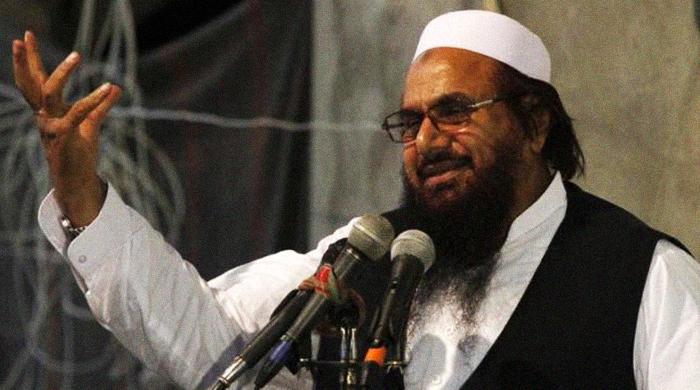JuD’s ‘Sharia courts’ working in seven cities
April 09, 2016

LAHORE: The supra-constitutional Sharia courts, established by Jamatud Dawa (JuD), operate across the country and only the Lahore court of this parallel judicial system has issued verdicts in 5,550 cases, including murder trials also to-date, The News has learnt.
What is most striking is that this parallel judicial system has been working even in the federal capital Islamabad since 1990, and it would be foolish to assume that the law-enforcement agencies had no clue about it.
This was disclosed by Mufti Muhammad Idrees, judge of Sharai Adalat at Masjid Qadsiya — the headquarters of the JuD. He claims that seven ‘Sharia courts’ have been functional for long, one each in Lahore, Gujranwala, Bahawalpur, Multan, Karachi, Quetta and Islamabad. JuD chief Hafiz Muhammad Saeed is the head of all these ‘courts’ and he is empowered to appoint judges as Head Qazi (chief judge). Similarly, he is also an appellant authority, as he reserves the right to hearing appeals and can dismiss decisions made by the ‘subordinate judges’.
Mufti Idrees says that the efficiency of the court can be measured by the speedy trials as around 5,529 cases of various criminal nature including murder, property and monetary disputes have been decided by the Lahore ‘Sharia court’ till November 10, 2015.
The Mufti said once a complainant approaches the court, it sends summons to the accused party. They appear before the court and clear their position. The ‘judge’ pays hearing to both parties and issues ‘verdicts’ in the light of the Sharia law. Both parities accept the verdict. “Any objection raised by any party is tantamount to disobedience of Allah and His messenger,” he claims.
He says Islam provides for payment of diyat, which is equal to 100 camels in cases where heirs of a murdered person agree on accepting compensation and forgiving the murderer. “I have solved five cases of murder. Diyat equal to the price of 100 camels was provided to the heir of the murdered person.
“Before announcing the verdict, we get cash or cheque from both parties as security deposit. If one party or both do not agree, the amount or cheque would be confiscated.”
Mufti says their courts have not even heard a single case of rape as there is need of four eyewitnesses to decide. DNA as evidence in rape cases is not acceptable in his opinion as there is no example of its use in the history of Islamic jurisprudence. He tells The News the ‘Sharai court’ is not only approached by people of Ahle Hadith school of thought but also people from others schools of thought, as they have confidence in it.
The writer visited the JuD ‘court’ in Lahore some period back to witness for himself the proceedings. The ‘courtroom’ was a moderately-lit small room where some people were sitting on a mat spread across the floor. One of them was sitting at a prominent place, while others were looking at him as if waiting for his instructions. The silence was broken by the entry of a family and the noises they created before entering the room. They were 10 in number — four men and six women — and had come there to get a family dispute, involving inherited property, resolved.
Both the complainant and the accused were giving their statements and the judge was asking intriguing questions to validate their statements. None of the parties could resort to crosstalk or utter a word while the judge was speaking.
The ‘judge’ was a bearded man, wearing a cap. He had the support of a coordinator (muavin), whose duties were quite similar to those of a moharrar. Both the parties had brought two witnesses each, who gave their statements. After listening to them and a hurling a volley of questions and cross-questions, the judge issued the ‘verdict’. Both parties expressed their satisfaction and left the place.
The Mufti clarifies that ‘Sharai courts’ do not issue orders of qisas. “It is the duty of the state to decide about the qisas. We are working according to Pakistan’s law,” he says.
An official in the office of Inspector General Police, Punjab, commented on condition of anonymity that legality did not matter in the case of the JuD because they are free to do anything as they are more powerful than others. “They have established a state within the state.”
The official wonders how a banned organisation can hold a ‘court’ to settle disputes of people. The JuD is running the courts as no one is allowed to visit their premises. Furthermore, the official adds, the JuD is a reality and a very effective pressure group, despite all its issues. “I am sure they have all the powers to summon people and get their orders executed. Hardly anybody can dare to defy their orders out of fear.”
Yahiya Mujahid, spokesperson for the JuD, says he has complete trust in the judicial system of the country. “It is evident from the fact that the JuD has always sought justice through the same Pakistani courts of law.”
The arbitrary council, established by the JuD, presided over by ulema, merely provides arbitration services to the consenting parties in the light of Quran and Sunnah, he says.
“Some circles are wrongly misconstructing the matter. In fact, arbitrary council is not a parallel court and it does not issue any kind of summon or seek money for arbitration,” he adds.
— This post originally appeared in The News











